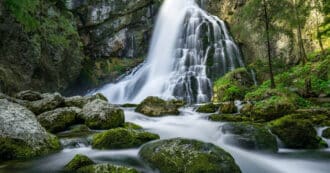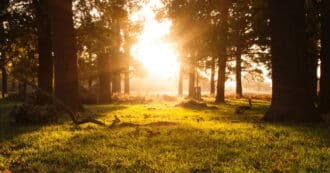The Rev. Dr. Leah D. Schade
God gives us a vision of Jubilee-restoration so that we can repair and rebuild both human communities and Earth’s ecosystems that have suffered from oppression and captivity.
Here are ideas for reading and preaching Isaiah 61:1-4, 8-11 and John 1:6-8, 19-28. This is part of the EcoPreacher 1-2-3 series to equip preachers and congregations for engaging the Bible through an ecological lens. These texts are assigned as part of the Revised Common Lectionary for the Third Sunday of Advent, Year B.
Eco-Exegesis
Eco-exegesis is a method of interpreting the biblical text through a green lens using the principles of ecological theology.
Isaiah 61:1-2
The spirit of the Lord God is upon me, because the Lord has anointed me; he has sent me to bring good news to the oppressed, to bind up the brokenhearted, to proclaim liberty to the captives, and release to the prisoners; to proclaim the year of the Lord’s favor, and the day of vengeance of our God; to comfort all who mourn.
“The year of the Lord’s favor” is a concept drawn from Leviticus. It is the Jubilee year when, once every fifty years, all debts were released, property restored, and economic imbalances righted. It’s the Sabbatical of all Sabbaticals. “The commandment of the Sabbatical year enables a return to the ideal relationship between humankind and creation,” write Rabbis Yonatan Neril and Leo Dee in Eco Bible, Vol. 2 (47).
The year of the Lord’s favor meant that the land was to be given rest by refraining from planting, pruning, plowing, or harvesting. As well, anything that the land produced was to be regarded as ownerless and thus free for all to gather and enjoy. And people, too, were to be freed from cycles of poverty in order to restore balance among the community.
Put differently, God wanted the land to get a break from human activity and simply rest in its Creator’s care. And God wanted rest for those who were relentlessly pushed to produce, especially those who were exploited in order to create wealth for the landowners. “The mandated abstinence from attempting to control the land and own its produce frees us from the enslavement of the constant pursuit of material goods and wealth and the idolatrous illusion that they make up our existence,” write Neril and Dee (47).
We can see, then, that this passage from Isaiah is about restoration. Ruins are rebuilt, cities are repaired. Those who have robbed and engaged in economic predation will face consequences. At the same time, those who have suffered from that predatory behavior will not only experience relief, but also rejoice in abundance. Meanwhile, the Earth itself celebrates the restoration with new growth.
John 1:23
John said, “I am the voice of one crying out in the wilderness, ‘Make straight the way of the Lord,’” as the prophet Isaiah said.
The Gospel of John echoes the prophetic words of Isaiah and attests that the vision of restoration will find fulfillment in the person of Jesus. From a postcolonial perspective, we can imagine the tension between light and darkness in the Prologue (John 1:1-18) manifesting as a struggle between the death-dealing forces of empire and the life-affirming forces of God’s reign.
It follows, then, that the wilderness in this passage is not meant to evoke grand vistas of majestic trees and wild, natural places. No, this is the devastation that results from land that has been subjected to extraction, relentless production, and even war. Making a straight pathway in this place means clearing space for something new to happen, something that cleanses and restores the Earth so that it can live into its potential as God’s Creation. In the same way, making straight the way of the Lord means clearing away the rubble of human brokenness so that dignity, freedom, and nurturing can find space to take root.
In this Advent season, a church can ask itself (through the words of the preacher): in what ways are we clearing away the rubble so that life can thrive? How are we actively working for the life-affirming forces of God’s reign? How do our ministries reflect this? And what might God be calling us to release in the coming year in order to cultivate more time and space for a relationship between ourselves and the beautiful, hurting Creation all around us?
The Eco-Idea is one succinct statement that tells us who God is and/or what God does in relation to Creation and how we should respond as people of faith.
God gives us a vision of Jubilee-restoration so that we can repair and rebuild both human communities and Earth’s ecosystems that have suffered from oppression and captivity.
Eco-Questions are what we can ask to help a congregation draw out the implications of the Eco-Exegesis and Eco-Idea.
- During this season of frenetic acquisition and consumerism in the lead-up to the commercialized holiday of Christmas, how can we make space for quietness, contemplation, and reconnection with God’s Creation?
- Where are the places in our community that are in need of rubble-clearing for God’s “straight path”? Has a climate disaster turned a habitable place to ruin? Has gun violence shattered the peace of families, schools, and neighborhoods? What are ways that people from our congregation can help to clear the debris, provide some breathing space, and offer respite and restoration?
Eco-Actions are ways that a congregation might respond to the Eco-Idea and Eco-Questions. One of these possibilities may have salience for your ministry context.
- From Eco Bible, Vol 2: “Ask your congregation to give back 10 percent of its land to the commons devoted to viable water-harvesting measures and scalable land-management practices to restore balance in our landscapes” (51).
- Encourage your community leaders to plant fruit trees and gardens in public places so that everyone can enjoy the produce for free. Visit https://www.changex.org/us/openorchard, https://www.smithsonianmag.com/innovation/are-edible-landscapes-future-public-parks-180976291/, and https://thegardenmagazine.com/5-reasons-cities-should-plant-urban-fruit-trees/ to learn more.
One way to rebalance the economic scales is by paying off the school lunch debts of students’ families in your local school district. Learn how your church can raise money for this here: https://angelink.com/blog/school-lunch-debt/, and here: https://www.schoollunchfairy.org/. At the same time, join lobbying efforts to make all school lunches free for students. Learn about a bill proposed by Congressional leaders to cancel student lunch debt here: https://www.govtrack.us/congress/bills/118/s2876/. Also, consider advocating for school lunches to include more plant-based food and less meat, fish, dairy, and eggs.
* Featured image source





